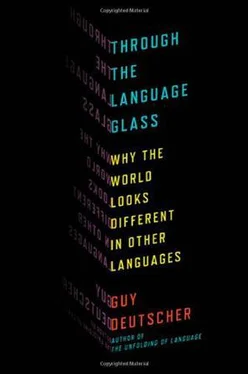While the extent of variation among different grammars is not contested, there have been vociferous arguments about how to interpret it. The divergence between grammatical systems poses a particular challenge to the nativist idea of an innate universal grammar, because if the rules of grammar are meant to be coded in the genes, then one could expect the grammar of all languages to be the same, and it is then difficult to explain why grammars should ever vary in any fundamental aspects. One influential nativist response to this challenge has been the theory of “parametric variations” within universal grammar. According to this idea, the genetically coded grammar contains a few “parameters,” that is, a small set of preprogrammed options that can be thought of as “on-off” switches. Children who acquire their mother tongue, so the argument runs, do not need to learn its grammatical rules-their brains simply set the preprogrammed parameters according to the language they happen to be exposed to. Nativists have claimed that different settings of these few switches must account for the whole variation in grammatical structures across the world’s languages. The only freedom that different cultures are accorded is thus to decide on how to set each of the parameters: press a few switches one way and you’ll get the grammar of English, set a few switches the other way and you’ll get the grammar of Italian, and flip a few more and you’ll get the grammar of Japanese.
The theory of parameters has met with much criticism and some ridicule among non-nativists, who maintain that the scope of variation among the world’s languages is far too wide to be covered by a few parameters, and that from an evolutionary perspective it is exceedingly unlikely that a genetically determined grammar would emerge with such a set of switches (whatever for?). But the main argument against the theory of parameters is that it is merely a convoluted way to account for grammatical variation that can be explained far more simply and far more easily if one does not insist on believing that specific grammatical rules are innate.
In short, the adamant claims of nativists about the innateness of grammar have met with equally resolute opposition from culturalists. The controversy over grammar has thus produced a most impressive pile of paper over the last decades, and many a library shelf across the globe quietly groans under its burden. This book will not add much weight to the debate, because it concentrates on the concepts of language rather than on grammar. But there is one aspect of the grammatical system that nonetheless cries out for attention, precisely because it has-wholly unjustifiably-escaped the controversy almost entirely: the complexity of the grammatical system. On this subject, an eerie consensus prevails among linguists of all creeds and persuasions, who unite in severely underestimating the influence of culture.
5. Plato and the Macedonian Swineherd
Ask Joe the Plumber, Piers the Ploughman, or Tom the Piper’s Son what sort of languages the half-naked tribes in the Amazonian rain forest speak, and they will undoubtedly tell you that “primitive people speak primitive languages.” Ask professional linguists the same question, and they’ll say something quite different. Actually, you don’t even need to ask-they will tell you anyway: “All languages are equally complex.” This battle cry is one of the most oft avowed doctrines of the modern discipline of linguistics. For decades, it has been professed from lecterns across the globe, proclaimed in introductory textbooks, and preached at any opportunity to the general public.
So who is right: the man in the street or the congregation of linguists? Is the complexity of language a universal constant that reflects the nature of the human race, as linguists assert, or is it a variable that reflects the speakers’ culture and society, as Joe, Piers, and Tom assume? In the following pages, I’ll try to convince you that neither side has got it quite right, but that linguists have fallen into the more serious error.
PRIMITIVE LANGUAGES?
The linguist R. M. W. Dixon, who pioneered the serious study of Australian aboriginal languages, reports in his memoirs about the attitudes he encountered in the 1960s on his first field trips to North Queensland. Not far from Cairns, a white farmer asked him what exactly he was working on. Dixon explained he was trying to write a grammar of the local aboriginal language. “Oh, that should be pretty easy,” said the farmer. “Everyone knows that they haven’t got any grammar.” In Cairns itself, Dixon was interviewed about his activities on a local radio station. The astonished presenter could not believe his ears: “You really mean the Aborigines have a language? I thought it was just a few grunts and groans.” When Dixon protested that they had much more than grunts and groans, the presenter exclaimed, “But they don’t have more than about two hundred words, surely?” Dixon replied that on that very morning, he had collected from two informants over five hundred names just for animals and plants, so the overall vocabulary must be much larger. But the greatest shock for the presenter was reserved to the end, when he asked which well-known language the local lingo was most similar to. Dixon replied that some grammatical structures in the aboriginal language he was studying were more similar to Latin than to English.
Today, the attitudes that Dixon encountered in the sixties may no longer be so common, at least not in such a crass form. And yet there still seems to be a widespread belief on the street-even on very good streets-that the languages of the Aborigines in Australia, Indians in South America, Bushmen in Africa, and other simple peoples around the world are just as simple as their societies. As folk wisdom would have it, an undeveloped way of life is reflected in an undeveloped way of speaking, primitive Stone Age tools are indicative of primitive grammatical structures, nakedness and naïveté are mirrored in infantile and inarticulate speech.
There is a fairly simple reason why this misconception is so common. Our perception of a language is based largely on our exposure to its speakers, and for most of us the exposure to aboriginal languages of all kinds comes mainly from popular literature, movies, and television. And what we get to hear in such depictions, from Tintin to Westerns, is invariably Indians, Africans, and sundry other “natives” speaking in that rudimentary “me no come, Sahib” way. So is the problem simply that we have been duped by popular literature? Is the broken speech we associate with the aborigines of diverse continents merely a prejudice, a figment of the twisted imagination of chauvinistic-imperialistic minds? If one took the trouble of traveling to North Queensland to check for oneself, would one discover that all the natives actually orate in torrents of Shakespearean eloquence?
Not quite. Although the popular accounts may not always conform to the highest standard of academic accuracy, their depictions are ultimately based on reality. As it happens, the aborigines do very often use a rough and ungrammatical type of language: “no money no come,” “no can do,” “too much me been sleep,” “before longtime me no got trouble” (I’ve never got into any trouble in the past), “mifela go go go toodark” (we kept going until it became very dark). All these are authentic examples of “native speak.”
But have you noticed the little snag here? The primitive language that we hear these people speak is always… English. And while it is true that when they avail themselves of the English tongue, they use a pared down, ungrammatical, rudimentary, inarticulate-in short, “primitive”-version of the language, this is simply because English is not their language. Just imagine yourself for a moment, eloquent, subtle, grammatically sophisticated creature that you are, trying to make yourself understood in a language you have never been taught. You arrive in a godforsaken village somewhere where no one speaks English and are desperate to find somewhere to sleep. All you have is a pocket dictionary. Suddenly all the layers of sophistication and refinement of your speech are unceremoniously shed. No more “would you be so kind as to tell me whether there might be anywhere in this village where I could find a room for the night?” Nothing of the sort: you stand there linguistically naked and stutter “yo dormir aquí?” “ana alnoom hoona?” or the equivalent of “me sleep here?” in whatever language you are attempting to make yourself understood in.
Читать дальше











